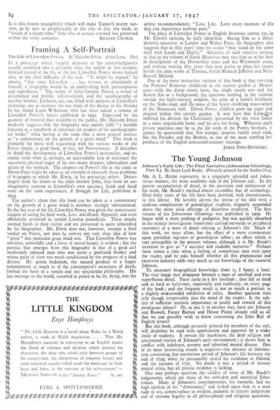The Young Johnson
MR. A. L. READE represents, in a singularly splendid and indus- trious manner, the more academic side of the Johnson cult. In the patient accumulation of detail, in the precision and enthusiasm of his work, Mr. Reade's method almost resembles that of archxology. Over forty years of his life have been devoted, with intermissions, to this labour. He lavishly adorns the shrine of his idol with a studious complication of genealogical trophies, elegantly suspended above the more solid offerings of dauntless erudition. The first volume of his johnsanian Gleanings was published in 1909. He began with a mere probing of pedigrees, but was quickly absorbed in the minute investigation (sometimes carried outwards to peripheral extremes) of a mass of detail relating to Johnson's life. Much of this work, we must allow, has the effect of a mere commentary upon parochial registers or genealogical tables • an effect which is very perceptible in the present volume, although it is Mr. Reade's intention to give us "a succinct and readable narrative." Perhaps there comes a time when a. feeling of somnolence may steal upon the reader, and he asks himself whether all this phenomenal and excursive industry adds very much to our knowledge of the essential Johnson.
To necessary biographical knowledge there is, I fancy, a limit. The vital image may disappear beneath a mass of unsifted and even superfluous detail. Facts rattle in a dry fusillade ; they fall as thick and as hard as hailstones, impartially and ruthlessly, on every page of the book ; and the frequent result is not so much a portrait as a slightly overcrowded exhibition of relics. Another question rises icily though irrepressibly into the mind of the reader: Is the sub- ject of sufficient intrinsic importance to justify and reward all this prodigious labour? Or, to put it in another way, have not Johnson and Boswell, Fanny Burney and Hester Piozzi already told us all that we can possibly wish to know concerning the John Bull of English letters? But this book, although privately printed for members of the cult, will doubtless be read with appreciation and approval by a wider circle of students. It reveals the murkiness, the drab religion and uncoloured routine of Johnson's early environment ; it shows him in conflict with indolence, poverty and inherited mental disease. One of its most interesting results is negative—the absence of informa- tion concerning that mysterious period of Johnson's life between the end of 1729, when he presumably ended his residence at Oxford, and the autumn of 1731. No doubt it was a period of intense mental crisis, but all precise evidence is lacking.
One may perhaps question the validity of some of Mr. Reade's judgements, which are those of the orthodox and uncritical John- sonian. Many of Johnson's contemporaries, for example, had no high opinion of his "dominance," and looked upon him as a man rude in wit, commonplace in wisdom, pedantic in literary judgement and of extreme bigotry in all philosophical and religious questions.
These people would not have agreed with' Mr. Reade that he was "able to avoid being an intellectual prig." It is also doubtful whether many of them would have allowed that Johnson had "an immense knowledge of classical literature." One is reminded again and again of Mr. Reade's obsession with genealogy and his undue stress upon the supposed effects of hereditary ingredients and of extraneous family influence ; both of them invoked, I think, as a surreptitious defence of method. But the physiology of Johnson is unquestionably a matter of considerable interest, and here Mr. Reade's information about his foster-mother, Mrs. Marklew, is apposite and extremely suggestive. It is, as Mr. Reade allows, "in extraordinary fact" that Johnson never visited his mother during the last nineteen years of her life and did not attend her funeral in 5759.
We cannot praise Mr. Reade too highly for his antiquarian zeal and his fine devotion to his purpose. If the zeal is rather grimly scholastic, and if the devotion is occasionally indiscriminate, that is no reason for refusing to congratulate him upon a great accom-



































 Previous page
Previous page